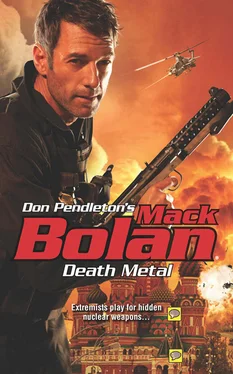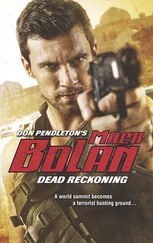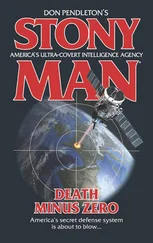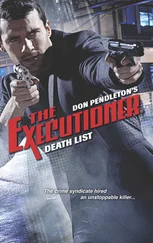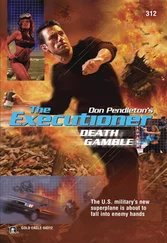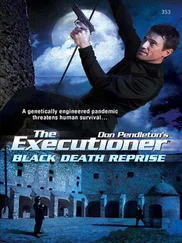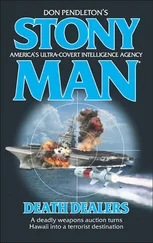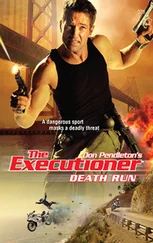“It’s been loaded with a whole lot of stuff. Put it on Shuffle—you’ll find out there’s more to life than Springsteen, Sinatra and Mellencamp,” she had stated.
Now, out in the wilds, he did as Price had asked, and slipped the buds into his ears before setting the MP3 playlist mode and looking at the vast deserted expanse around him. His grin broadened as the first piece of music swelled in his head, seeming to fill the very air around him, even though the forest’s perfect stillness and silence remained, should he choose to pull the buds from their resting place. He recognized the piece as being by Copland, one of his mother’s favorites, and there was nothing—and no one—who he could think of as more appropriate to his surroundings.
Bolan stood perfectly rigid against the sky as the music took him on a journey that relaxed his mind so that he could feel the tension slip from his body, only the loose elasticity of his easy-but-still-animal-alert muscles betraying anything other than complete relaxation.
Suddenly a charging surge of bilious, overamplified and distorted guitar chords blurred into a white noise punctuated by a barrage of bass drums shot through with a bass guitar so low that it was barely audible—more felt than heard. Smashing through this, like an insistent pickax to the head, a snare drum beat a rhythm that had all the swing of a boot camp parade ground and threatened to spear Bolan’s frontal lobe with a viciousness that felt like a migraine.
As the rhythm became more disjointed and jerky, something that might have been a human voice—but only by association—joined the mix. It sounded for the world as though someone was either belching or hurling or maybe both. Singing was hardly the description Bolan would have used for it, but as there seemed to be syllables that were vaguely related to words somewhere in there, he could only guess that this was the purpose.
“What the—” Bolan pulled the buds from his ears and looked at the face of the MP3 player. It told him that this shapeless and formless mess had a title—so was presumably intended to be a song—and even had a band that was prepared to hold up its hands and claim ownership.
The “song” was appropriately entitled “To the Gates of Oblivion,” and the group claiming credit for this little masterpiece—and on reflection he guessed it probably was in its own way—was named Abaddon Relix. Which was what? A reference to some old demonic mythological figure? Bolan had a vague recollection of the name Abaddon from somewhere, but the Relix bit? Who knew?
One thing was for sure, it was such a testosterone-fuelled racket that Bolan very much doubted Price was responsible for placing it on the playlist.
He was pretty sure he knew who, though. He hit a speed-dial number on his smartphone as he killed the noise—now tinny and hollow at a distance—before dropping the MP3 player on top of his pack.
“Striker, you’re supposed to be chilling out and working that musculature,” Kurtzman said with some surprise. “What’s up?”
“Barbara’s MP3 player,” Bolan replied flatly.
“What? Don’t like the tunes?” Kurtzman asked.
“I’m guessing that you maybe had a say in what she loaded onto it.”
“Aah,” Kurtzman said followed by a pause. “Which little aural delight has tickled your ears, Striker?”
“Abaddon Relix,” Bolan said.
“Interesting little band, isn’t it?”
“That’s one word for it. I know you all think I have limited tastes, but when I hear something like that, I think that may not be such a bad thing.”
“I was just trying to broaden your horizons a little. You’d be surprised at what I put on there without her knowing.”
“I don’t think so,” Bolan replied. “It doesn’t really go with the landscape. Good call on the Whitman, Bear, but I wonder if you may need to get a hearing test.”
“Admittedly it’s not to everyone’s taste,” Kurtzman conceded. “There is one thing, though. It wasn’t entirely for leisure or for the sake of shaking you up a little that I put that band on there. They were on my mind, as the name has cropped up in some unlikely places of late.”
Bolan’s interest was piqued. “Unlikely as in work related?”
“Could be. When you pitch your tent for the night, take a little time to look them up on YouTube.”
“I’m guessing you’re not expecting me to be drooling at the thought of concert footage?”
“There’s plenty of that but no—the more recent video uploads have been of a radically different nature. Tell me, Striker, what do you know about black metal and death metal?”
“There’s a difference?”
“Musically, yes, if you like them. If you don’t, then the similarities mirror the closeness that exists in their worldview. Maybe you should surf a little. It’ll while away the twilight hours.”
“Homework? You think something could be that imminent?”
“I have a hunch, and you know how that works.”
Bolan looked at the sun high above him. If he set out now, he could be at his map objective well before dusk. It looked like he needed to be; it may well prove to be a long evening.
“Oh, yeah, I know how that works,” he eventually replied.
* * *
IT WAS A LONG AND DULL drive from Helsinki to Karelia. Baron Kristalnacht—or Arvo, to his mother and father—sat in the rear of the car, slowly sinking the level of his bottle of vodka while his moaning became a lower rumble in his throat.
He was just the drummer, was he? Everyone made fun of the drummer. Drummers were stupid; they knew nothing; and all they were good for was hitting things. That was what the rest of the band thought. He knew that, and he was slowly getting more and more pissed off about it.
“You think I’m some kind of moron, right?” he slurred in a louder voice.
Severance—Uhro to his parents, who hadn’t realized he was taking the car when he told them he was going out—frowned through the windshield as he leaned over the wheel, trying to see through the sleet that the wipers were barely touching. Arvo was a prick, but not because he was a drummer. He was a prick because he had a big mouth. Severance didn’t need this kind of hassle. He had enough problems, more pressing concerns.
“You’re not answering, man,” the Baron admonished him, gesturing with the bottle and cursing when some of the spirit threatened to slop out of the neck. “Who found it in the first place? Why does that idiot Mauno want to take the credit?”
“Because he has an ego as big as your drinking problem,” Severance replied. “That’s why he went to Norway and we’re here, keeping an eye on things. And that’s why he took Jari with him—because he’s a big lug who hits first and asks questions later.”
The Baron smiled with the absent humor of a drunk. “Man, that Jari, he really is stupid. He should have been a drummer, if not for the fact he can play a guitar like an angel. A dark one, of course,” he corrected himself.
He stopped, looked puzzled for a second, then continued. “Sev, you write the words. You can death grunt better than Mauno, and his guitar playing is shit. Jari could do it all in the studio, and it’s not like we gig that much. Why is Mauno in the band anyway?”
“Because,” Severance said through gritted teeth, “he’s the one with the vision and the drive. That’s what he keeps telling me, anyway. I just wish he’d kept it to the music.”
“Man, that’s our turnoff,” the Baron interrupted, gesturing recklessly with the bottle as they approached.
“I know,” Severance growled. “I’m not a drummer. Now just sit back and shut up until we get there. I need to concentrate in this crappy weather.” He wondered briefly if he should get the Baron to check their guns before they arrived on site, just in case, before figuring that asking a drunk drummer to check firearms in the enclosed space of a car was not a good idea.
Читать дальше
